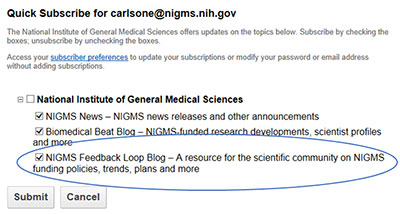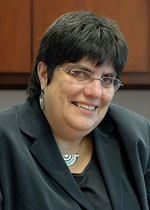I’m pleased to announce that NIGMS is the new home for the Science Education Partnership Awards (SEPA). These awards, which were transferred from NIH’s Division of Program Coordination, Planning, and Strategic Initiatives, support research and educational activities that complement other workforce diversity and training programs within NIH mission areas. The change will allow the SEPA program to be better integrated with other NIGMS capacity-building and research training programs and will increase opportunities for synergies between them.
The SEPA program promotes partnerships between biomedical and clinical researchers and pre-kindergarten to grade 12 teachers and schools, museums and science centers, and other educational organizations. In addition, the program provides students from underserved communities with opportunities to learn about research careers; supplies teachers with professional development in science content and teaching skills; and improves community health and science literacy through its science centers and museum exhibits.
SEPA will be housed in our Center for Research Capacity Building (CRCB), which supports research, research training, faculty development and research infrastructure improvements in states that historically have not received significant levels of research funding from NIH. It also supports faculty research development at institutions that have a historical mission focused on serving students from underrepresented groups.
We do not plan to alter the mission or goals of SEPA as a result of the transfer, and the program will continue to be administered by Tony Beck, who has served as its program director since 2001.
If you have any questions about the transfer, please contact Tony Beck or Fred Taylor, acting director of CRCB.



 Among this year’s PECASE recipients (nominated in 2014) are two NIGMS grantees, Tufts University’s
Among this year’s PECASE recipients (nominated in 2014) are two NIGMS grantees, Tufts University’s 
 I’m pleased to announce that Stephanie Constant will be joining us in early 2017 as the new chief of our Office of Scientific Review.
I’m pleased to announce that Stephanie Constant will be joining us in early 2017 as the new chief of our Office of Scientific Review. I’m very pleased to announce the selection of Rochelle Long as director of our
I’m very pleased to announce the selection of Rochelle Long as director of our  Helen Sunshine, who led the NIGMS Office of Scientific Review (OSR) for the last 27 years, retired in April. Throughout her career, she worked tirelessly to uphold the highest standards of peer review.
Helen Sunshine, who led the NIGMS Office of Scientific Review (OSR) for the last 27 years, retired in April. Throughout her career, she worked tirelessly to uphold the highest standards of peer review. Ever since the NIGMS Feedback Loop launched in 2005, we’ve sent periodic digests of its content to our grantees, applicants and others. To help our readers receive time-sensitive information sooner, we’re now offering a way to get individual posts as they’re published on the blog.
Ever since the NIGMS Feedback Loop launched in 2005, we’ve sent periodic digests of its content to our grantees, applicants and others. To help our readers receive time-sensitive information sooner, we’re now offering a way to get individual posts as they’re published on the blog. I’m very pleased to announce that Dorit Zuk will be joining us in early 2016 as the new director of our
I’m very pleased to announce that Dorit Zuk will be joining us in early 2016 as the new director of our